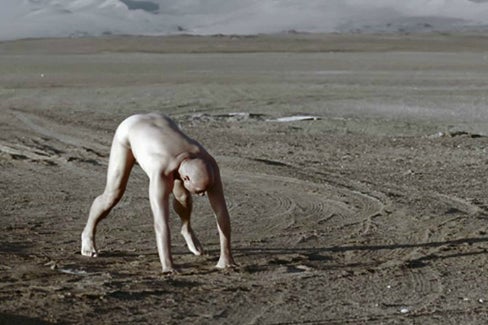Lek and the Dogs review: Andrew Kötting’s latest feature is a disconcerting affair
This film may be uneven and self-indulgent but it is also full of moments of startling lyricism and originality

Your support helps us to tell the story
From reproductive rights to climate change to Big Tech, The Independent is on the ground when the story is developing. Whether it's investigating the financials of Elon Musk's pro-Trump PAC or producing our latest documentary, 'The A Word', which shines a light on the American women fighting for reproductive rights, we know how important it is to parse out the facts from the messaging.
At such a critical moment in US history, we need reporters on the ground. Your donation allows us to keep sending journalists to speak to both sides of the story.
The Independent is trusted by Americans across the entire political spectrum. And unlike many other quality news outlets, we choose not to lock Americans out of our reporting and analysis with paywalls. We believe quality journalism should be available to everyone, paid for by those who can afford it.
Your support makes all the difference.Dir, Andrew Kötting, 92 mins, starring: Xavier Tchili
Visionary British director Andrew Kötting’s latest feature is a disconcerting affair, pitched between drama, archive-based documentary and art world installation. The first images are of a bald, naked man on his haunches, scrambling through the desert.
This is Lek (Xavier Tchili), the Mowgli-like anti-hero of the tale. As we gradually discover, he grew up in terrible privation, desperately missing his wastrel mother and experiencing “betrayal, abandonment and isolation”. In his misery, he joined a pack of wild dogs. “They disappeared into the ground. I followed them.”
The dogs accepted him as one of their own. They certainly treated him better than the adults who made his childhood such a misery. After his time with the dogs, Lek re-enters human society. He marries and even fathers a child but he remains a tormented and isolated figure.
Lek recounts his own story, muttering his words in the dark as if he is a younger version of Patrick Magee in Krapp’s Last Tape. There are also patronising observations on his case from an unseen expert, perhaps a British psychiatrist. Adding to the jarring effect of the film, the main character speaks in Russian but the commentators on the soundtrack use English
Some of the high-minded philosophising about human nature and destructiveness verges on the pretentious. The film is based on a true story and is loosely adapted from a play (by Hattie Naylor), but Kötting also seems inspired by the writings of German academic WG Sebald.
The film is divided into chapters, each introduced by slogans like “Truth Is Asleep” or “The Trauma Of Betrayal” or “The Mind In A Cave” or “The Nature Of Eternity”.
In spite of the glum subject matter, Kötting approaches the material in his familiar playful style. At one stage, we see Lek as an Ozzy Osbourne-like heavy metal rocker, howling away on stage. The director uses archive in an impressionistic and inventive way too. Old footage of miners and factory workers has little to do with the story he is telling but the grainy old material fits the mood he is trying to evoke.
We’re never sure which parts of Lek Kötting has filmed himself and what he has gleaned from other sources. He includes plenty of very striking imagery of feral dogs on rubbish dumps or roaming dusty streets.
One moment, Lek will be goofing around like a character in a Monty Python sketch and the next Kötting will be portraying him as a nostalgic loner who seems to have wandered into frame out of one of Russian director Andrei Tarkovsky’s evocations of a lost childhood. Lek And The Dogs may be uneven and self-indulgent but it is also full of moments of startling lyricism and originality.
‘Lek and the Dogs’ hits UK cinemas 8 June
Join our commenting forum
Join thought-provoking conversations, follow other Independent readers and see their replies
Comments